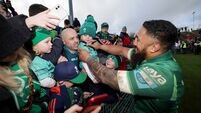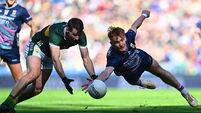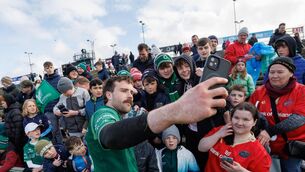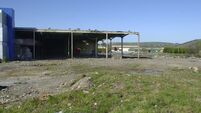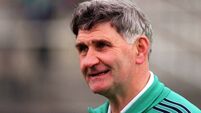Kieran Shannon: Cork hurlers have always been able to take or leave the league

Tomas Mulcahy of Cork looses his hurley in the 1993 National Hurling League Final with Wexford
Even in their glory years Cork always had an ambiguous relationship with the league. Exiting it was no big deal and winning it could be similarly easily dismissed and forgotten.
Before the 1984 centenary All-Ireland final, the late Mick Dunne attended the Cork press night for RTÉ and its then flagship primetime Saturday television show, Sports Stadium. In one segment he was interviewing an obliging yet relaxed Dermot McCurtain, one of the finest and most decorated players of his era, when he mentioned about the only previous Cork had with their upcoming opponents.
“And, of course, you played Offaly in that league final in 1981.”
Cue, you’d have presumed, some soundbite about the awful conditions that visited Thurles that afternoon, Cork’s lightning-fast start, Offaly’s gallant if futile comeback, and possibly how Offaly were now a more seasoned and proven team since then.
Instead McCurtain’s forehead creased, before he turned to nearby teammates with a quizzical smile. “What match was that?!”
For a man about to play his third All-Ireland final in the space of 24 months and his 12th in all grades in all codes (10 years earlier he won both the minor hurling and football finals), some league final from three years earlier was too random and insignificant to recall.
There was possibly good reason though why McCurtain had erased it from his memory.
The previous year he had captained Cork to another league title, beating Limerick in a replay after a couple of epic games in Páirc Uí Chaoimh. But later that summer the sides met for a third time, in the Munster final, in Thurles. Limerick won. Cork didn’t see Croke Park that year.
Each season from 1974 to 1986, Cork always won at least one trophy but some were clearly more equal than others. The three years Cork won the league in that span – ’74, ’80 and ’81 – were the three years they didn’t win Munster. In another county some national silverware was cause to be celebrated and remembered but for Cork and a McCurtain those leagues and the seasons they were won in were write-offs.
That suspicion that a good end to the spring could lead to a short, bad summer continued for another couple of decades at least.
In 1993 Cork, coming off losing the previous year’s All Ireland, ended up in a league final against Wexford. What started off as something novel, a day out, turned into a marathon trilogy because of its peculiar dynamic; as Brian Corcoran, the Cork captain that year, put it in his autobiography, “Wexford were so desperate to win and Cork were too stubborn to lose.”
After the second drawn game Ger Cunningham confided to Dr Con Murphy coming out of Thurles that he’d have preferred to have lost than to have drawn. “We’d been sucked into a whole saga that had become more important than it actually was,” he’d reflect years later. “Before we knew it we were into championship without enough work being done.”
Cork’s subsequent shock defeat to Clare three weeks later was the start of one of the bleakest periods in Cork hurling history; it would take until 1998 for the county to win a significant championship match again.
The catalyst for that landmark win over Limerick though had been winning the league only weeks earlier. A Cork public, reawakened from its slumber by the crowds Clare and Waterford were attracting along with the emergence of an exciting young team of their own to follow, travelled to Thurles in its droves that May. Without those league wins over Clare and Waterford in ’98, they would hardly have had those championship wins over the same counties in ’99 or Mark Landers lifting any cup in the rain in Croker.
That was about the height of what that generation of player gave to the league. In the O’Grady-Allen years only Kilkenny won more league games than Cork did and in that time Cork were the only county never to lose either a league or championship game by more than seven points. Yet in that time they never contested a league final while every other county in Munster did and Kilkenny routinely would.
In those years Cork’s winter and spring training facilities would have been limited compared to those of their rivals, what little ballwork they’d have been doing compromised by the quality of their floodlights. But mostly it was a case of a proven team pacing itself.
“Traditionally in Cork the target for the league would be to get to a semi-final,” Ger Cunningham, a member of those management teams, noted in 2008. “Especially when you have a new manager. You’re winning games, confidence is reasonably high and with a semi-final you’re guaranteed a good game. If you get to a final then, it’s a bonus. Kilkenny would have a different focus because of the way Leinster is structured and scheduled; they needed to get to league finals. In Munster you’re normally tested a lot earlier.”
That tradition and trend would continue. Denis Walsh reached a league final in his first year proper in 2010; Jimmy Barry-Murphy his first year back in 2012 (as well as his last in 2015).
But the thing was Cork didn’t win any of those league finals (throw in the 2022 loss to Wexford and the average losing margin in those finals has been 9.8 points). Or go on to win any All Irelands. Whereas in the Cody era numerous other sides did.
Before Cody’s appointment in the autumn of 1998, Kilkenny trailed Cork by five league titles in the roll of honour: while Cork were on 14, second only to Tipp’s then 16, Kilkenny were only on 9.
Now they are on 19, five ahead of Cork, and level with Tipp.
The world has changed and with it their attitude to the league.
For the longest time Cork’s history with the league bordered on superstition based on suspicion.
In only four of the 14 years they won the league did they also go on to win the All Ireland: 1926, 1941, 1953 and 1970.
But in the Cody era it became routine for others to win the double. Tipp in 2001. Kilkenny in 2002, 2003, 2006, 2009, 2012 and 2014. Galway in 2017. Limerick in 2020 and 2023. Last year Clare won the two of them.
That trend has not gone unnoticed in the Cork camp, especially with Gary Keegan among their ranks.
Although Keegan did not come on board the Dublin football setup until the late summer of 2015, Jim Gavin’s group would have influenced his mindset as much as he influenced theirs. In Gavin’s first year (2013) they lay down markers everywhere, starting with the league; would they have shaded that year’s All-Ireland final against Mayo had they not beaten them twice already that spring and Bernard Brogan had already scarred a couple of their backs?
Winning, like excellence, became a habit not an act for that group and this Cork group with its sense of mission and explosive scoring power has echoes of Dublin 2013.
Cork remain the last county other than Limerick to win the Munster hurling championship. But that was seven long years ago now.
Since Seán Óg Ó hAilpín lifted Liam MacCarthy 20 years ago, every other top-nine hurling county, bar Wexford, has won national senior silverware. Waterford have won three leagues, even Dublin one in 2011.
It’s been too long and Cork are too good for their wait to extend beyond Sunday.
But they’ll hardly get carried away. For one, that’s not the cup that they’re wanting.
And as Ger Cunningham can tell his son Ben or any of his teammates, the last three Cork teams to win the league were beaten by Clare only weeks later in the Munster championship.

